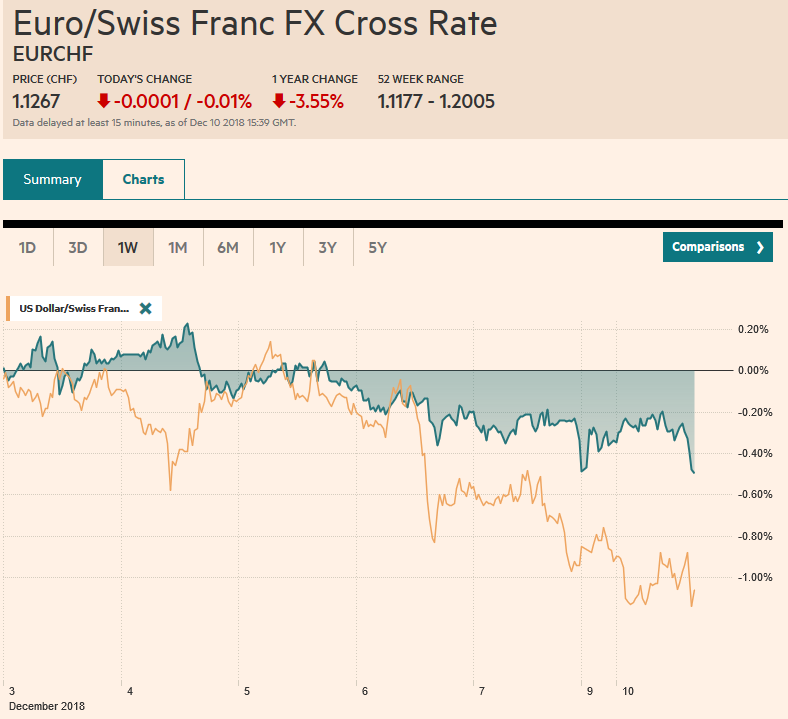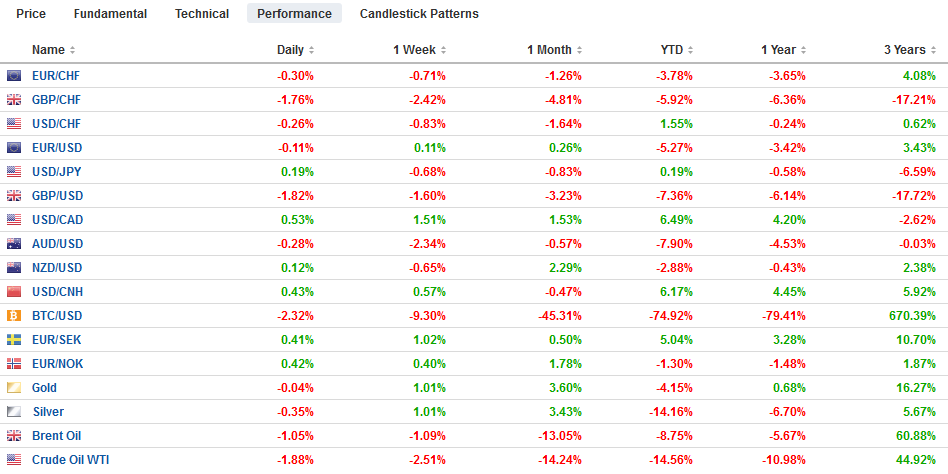Swiss Franc The Euro has fallen by 0.01% at 1.1267 EUR/CHF and USD/CHF, December 10(see more posts on EUR/CHF and USD/CHF, ) - Click to enlarge FX Rates Overview: Investors angst over trade tensions and Brexit continue remains elevated, and poor Chinese and Japanese economic news played on global growth fears. Equities continue to slog lower. Bond yields are little changed, and the dollar is lower against most of the major currencies. Among emerging market currencies, those in eastern and central Europe are faring best, helped by a euro trading at two-week highs against the greenback. Outside of the US JOLTS report and Canada’s housing starts and permits, the North American diary light. The focus is on the
Topics:
Marc Chandler considers the following as important: $CAD $GBP, 4) FX Trends, AUD, EUR, Featured, GBP, JPY, newsletter, SPX, USD
This could be interesting, too:
Nachrichten Ticker - www.finanzen.ch writes Die Performance der Kryptowährungen in KW 9: Das hat sich bei Bitcoin, Ether & Co. getan
Nachrichten Ticker - www.finanzen.ch writes Wer verbirgt sich hinter der Ethereum-Technologie?
Martin Hartmann writes Eine Analyse nach den Lehren von Milton Friedman
Marc Chandler writes March 2025 Monthly
Swiss FrancThe Euro has fallen by 0.01% at 1.1267 |
EUR/CHF and USD/CHF, December 10(see more posts on EUR/CHF and USD/CHF, ) |
FX RatesOverview: Investors angst over trade tensions and Brexit continue remains elevated, and poor Chinese and Japanese economic news played on global growth fears. Equities continue to slog lower. Bond yields are little changed, and the dollar is lower against most of the major currencies. Among emerging market currencies, those in eastern and central Europe are faring best, helped by a euro trading at two-week highs against the greenback. Outside of the US JOLTS report and Canada’s housing starts and permits, the North American diary light. The focus is on the fallout from the recent arrest of the CFO of Huawei. The vote on the Withdrawal Bill in the UK House of Commons is slated for tomorrow, and European Court of Justice confirmed the earlier indication that the UK can revoke Article 50 unilaterally. |
FX Performance, December 10 |
Asia
China reported November trade and price data over the weekend. The trade surplus swelled to $44.7 bln from $34 bln in October. Both imports and exports slowed, but the former is now up only 3% from a year ago (from nearly 21.5% in October). Exports growth moderated to 5.4% from 15.6%. However, the record trade surplus with the US and faster export growth will not help in negotiations. Exports surged 9.8% year-over-year, while imports slowed 25%. Many press accounts seem to misconstrue one of the factors at work. They write as if Chinese exporters boosted exports to the US to beat the tariffs. It is the importers, which are not typically Chinese companies that are trying to beat the tariff. They are the ones that pay it. This is boosting inventories. Both the trade and inventory distortions will be unwound in Q1 and could have material impact on the economic data.
Separately, softer than expected price pressures China report are consistent with a weakening economy, but there may be other factors at play. Producer prices rose 2.7% from a year ago, down from 3.3% in October, and is the lowest in two years. The main driver looks to be the decline in oil prices. Consumer prices rose 2.2% from a year ago, down from 2.5% and slower than expected. Two-thirds of the slowing can be accounted for the decline in food prices. Food price increases slowed to 2.5% from 3.3%, and this was a function of vegetable price pressures collapsing to 1.5% from 10.1%. Non-food prices fell for the first time since March and maybe energy related.
Both the US and China seem intent so far not to let the enforcement of the US embargo against Iran to upend the fragile trade negotiations, which Lighthizer, who is leading the US negotiating team, emphasized the limited 90-day period to reach an agreement. China cannot simply accept the US actions, but the protests seem modest. The harshest comments seem directed at Canada rather than the US. We suspect the key issue is whether Xi’s economic adviser Liu will still l lead a trade delegation to the US this week or next.
Japan reported that its Q3 GDP contracted twice as much as it initially estimated. Rather than contract by 0.3%, output fell 0.6%. The annualized pace of the slump was 2.5% rather than 1.2%. A Reuters survey showed that a downward revision was likely, but the median forecast was for a -1.9% pace. The poor economic showing was largely a function of the natural disasters, and the economy already appears to be recovering in Q4. Industrial output surged 2.9% in October, according to the initial report that may be revised this week.
The Nikkei gapped lower to approach the late October lows near 21000. The year’s low was set in March near 20,350. The US dollar found support at last week’s low (~JPY112.25). Several expiring options could test the greenback’s recovery. There are roughly $1.27 bln struck between JPY112.40 and JPY112.50 that roll off today. There is also nearly $1 bln at JPY113.00. The softer Chinese data initially seemed to weigh on the Australian dollar. It fell to almost $0.7170, its lowest level since mid-November before snapping back and is now threatening to end its four-day slide. The pre-weekend high was set near $0.7240, and just beyond there, at $0.7250, is an A$812 mln option expiring today.
Europe
The European Court of Justice decision could impact tomorrow’s vote in the UK Parliament. The ruling is two-fold. First, that the provided the Withdrawal Bill (exit deal) is not agreed, the UK can revoke Article 50. Second, if Article 50 is revoked, then the status quo ante in terms of EU membership terms remains. This would seem to encourage the Remainers to vote against the bill tomorrow. The bill is widely expected to be rejected, but the key may be the margin. Many observers are suggesting that if May is less than around 75 votes shy, it is still possible that with a few adjustments, it can be approved in a second attempt. A loss of 100 or more votes and the risk of a no-agreement jumps and would be expected to weigh on sterling.
The French demonstrations continued over the weekend, and President Macron will be addressing the nation later today. A meme in the social media is to attribute the Yellow Vest protest to Russian agitation. While Putin apparently sees Russian interest in disruption and discord, fanning such social tensions is not the same as causing them. Given the anti-elitist movement throughout the EU, attributing the French protests, which some romantics compare to 1968 or 1848 or 1789 to Russia does not do the situation justice. Macron is both the cause and effect of the breakdown of the political elite. He has been unable to get ahead of it. The French premium over Germany is widening a bit more today.
With other tensions in Europe and mild rhetoric from Italy’s government, the dispute over the Italian budget is not serving as lightning rod now. Italy’s 10-year yield is off almost five basis points today to return to the lows from last week a little above 3%. A moderate faction within the government appears to be working with the Five Star Movement and the Leauge to make some tweaks in their programs, like staggered start dates, to find 4 bln euros in savings. The EC reportedly is demanding 8 bln euros. Separately, but helpful, Italy reported that industrial output unexpected edged higher in October. The 0.1% increase compares with expectations for a 0.3% decline, and recall the October manufacturing PMI fell below 50 the boom/bust level for the first time since August 2016. On an unadjusted basis, industrial output was up 4.2% above a year ago.
Germany’s October trade surplus was unchanged at 18.3 bln euros. Most economists had expected some narrowing. Both imports and exports improved. Imports rose 1.3% after September’s 0.4% decline was revised away. Exports edged 0.7% higher after September’s 0.8% decline was halved. Despite the steady trade balance, the broader current account surplus fell by nearly a quarter to 15.9 bln euros from 21.4 bln in September. The German current account surplus averaged 21.8 bln euro a month in 2017. This year’s average is 20.3 bln.
The euro reached session highs (almost $1.1445) in Asia. It is its best level since November 20. It found bids in the European morning as $1.1400 was approached. The intraday technical indicators suggest another attempt to the upside is likely in North America today. Above $1.1450, the $1.1500 level beckons. There is a roughly 735 mln euro $1.15 option that rolls off today. The euro has not closed above its 50-day moving average since October 11. It is found near $1.1415 today. Sterling was pinned in a narrow range above $1.2700 but is probing below there in late morning turnover in London. There are a couple of modest options to note that are expiring today. There are GBP300 mln at $1.2650 and nearly GBP225 at $1.2725.
North America
The key level in the S&P 500 today is the late October low just above 2600. A break targets the 2530-2550 area, which corresponds with the February low, which is the low for the year and the April low respectively. In the same vein, the key yield level for the 10-year Treasury note is 2.80%. The Dollar Index slipped below 96.50 which it has done a few times in recent weeks, but it has not closed below it since November 19.
Canada’s record jobs growth reported before the weekend preserved some lingering ideas that the central bank may still hike rates next month. Housing data is featured this week, and it is a weak spot for the Canadian economy. Initial resistance for the US dollar is seen near CAD1.3340. Support pegged around CAD1.3280. The US two-year premium over Canada remains elevated a little above 70 bp. At the start of last month, it was about 20 basis points less.
Tags: #GBP,#USD,$AUD,$CAD $GBP,$EUR,$JPY,Featured,newsletter,SPX


